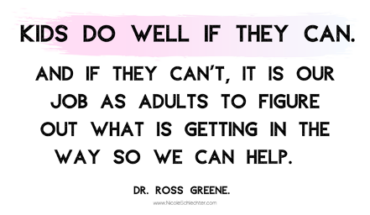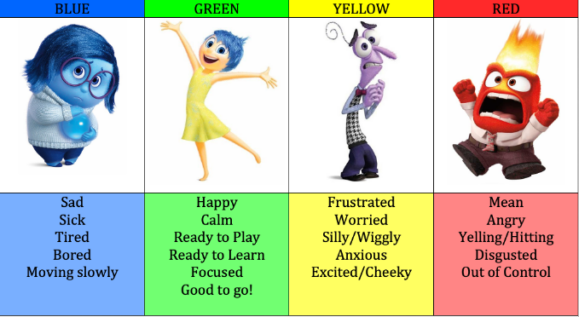Understanding and Managing Children’s Challenging Behaviours – For parents
laura on 13/02/2024

Photo by Caleb Woods on Unsplash
Have you ever experienced the challenge of navigating a teenager’s sudden outbursts or trying to calm a younger child’s meltdown in a crowded store? It’s a common scenario for many parents.
Understanding why the challenging behaviour occurs
Psychologist Ross Greene’s Collaborative & Proactive Solutions (CPS) approach emphasises that if they could do well, they would do well.
Understanding why children exhibit challenging behaviours is the first step toward effectively managing such behaviours. No child wakes up and decides that they want to do ‘bad’ things or have a meltdown in front of all of their friends! Fundamentally, all children want to do well, and it is up to parents and caregivers to try to understand why they are engaging in behaviour that interferes with their ability to meet expectations at home, school or in the community.
Often, children with behavioural challenges are labelled negatively. Let’s have a look at some of these all-too-common terms…
‘They’re attention seeking!’.
- This label identifies an unmet need in the child’s life but offers limited solutions. It implies that the child is acting with intention.
‘They’re manipulative!’
- Children engaging in challenging behaviours do so impulsively, emotionally and without much forethought. Competent manipulators possess many skills, such as planning, impulse control, and organisation.
‘They’re unmotivated!’
- This label doesn’t capture what is going on with a child and may create low self-worth, leading to further challenges in the future.
‘They’re testing the limits!’
- This often leads parents to prioritise compliance over understanding and addressing factors contributing to behaviours.
Children may lack the skills to behave appropriately. They may have unsolved problems or even unmet needs contributing to their behaviour. Adults can help by collaboratively finding the cause of their child’s challenging behaviours and helping them implement strategies.
Image by Nichole Schlechter on https://nicoleschlechter.com
Managing challenging emotions and behaviour
When a child is struggling to regulate their emotions, their ability to engage in problem-solving and collaboration is compromised.
The Zones of Regulation framework provides a systematic approach to help children understand and manage their emotions and behaviours. By categorising emotions and states of alertness into four colour-coded zones – Green, Blue, Yellow, and Red – children learn to recognise and label their feelings, gaining awareness of their current emotional state.
Techniques such as deep breathing or taking a break may help young people calm down in the Red Zone, while activities like visualisation or positive self-talk can help them shift back to the Green Zone.
It is essential for parents to remember that when a child is engaging in unsafe, challenging behaviours, the critical goal is always de-escalation. No learning occurs when a person is dysregulated. The team of child clinicians at Your Mind Matters can support children and their parents in learning to use de-escalation strategies to calm their bodies and minds.
This poster was put together by Elina from Your Mind Matters but is based on information from https://zonesofregulation.com/. Have you seen the movie Inside Out (PG ages 6+) to recognise these characters?
Teaching adaptive behaviour and skills
In addition to emotion regulation, it’s essential to teach children adaptive behaviours and skills that will help prevent future challenges, according to Ross Greene’s Collaborative & Proactive Solutions (CPS). Children who demonstrate challenging behaviours already receive negative natural consequences for their behaviours. Giving them more consequences and punishing them (e.g. detentions, removing favourite toys, yelling) does not give them the skills to succeed and instead may just further harm their self-esteem.
What interventions DO solve problems and teach skills?
Identifying situations where the child’s skills are consistently lacking:
E.g. Your child yells and cries when they lose
Implement a cool-down routine.
E.g. A go-to activity to regulate emotions when upset.
Teaching the child practical ways to improve their skills:
E.g. Teach the child how to recognise physical signs of anger and disappointment.
E.g. Teach coping strategies like self-talk
Remove barriers that impact the child’s success:
E.g. Modify the game to reduce the emphasis on winning/losing.
Practise, practise, practise!
E.g. Role playing different reactions to losing a game.
Provide accommodations:
E.g. Allow for mistakes and setbacks and be flexible in your approach as the child learns the new skill.
Managing challenging behaviours in children and teens can be a daunting task, but parents and caregivers do not have to navigate it alone. Every child is unique, and finding the right strategies may take time and patience. If you would like support in parenting a child with challenging behaviour, our team of clinicians can help.
Additionally, if you are interested in learning more about Ross Greene’s CPS model to working collaboratively with children and teens, you may enjoy his lecture below:
https://www.youtube.com/watch?v=VsTvUiSxfls
This blog was written by Elina Makela – Psychologist (Educational and Developmental Psychology Registrar) at YMM.
Elina is passionate about helping young people presenting with behavioural and emotional difficulties. Elina works collaboratively with families to support young people with developmental difficulties related to Autism Spectrum Disorder (ASD) and Attention Deficit Hyperactivity Disorder (ADHD). She also has a strong interest in working with young people who experience eating difficulties, poor body image, sleep issues, and anxiety. Through warmth, compassion and play, Elina creates rapport with her younger and adolescent clients.
To learn more about Elina, check out the “Our Team” page on our website! https://yourmindmatters.net.au/our-team/
- Category: Child development and parenting


